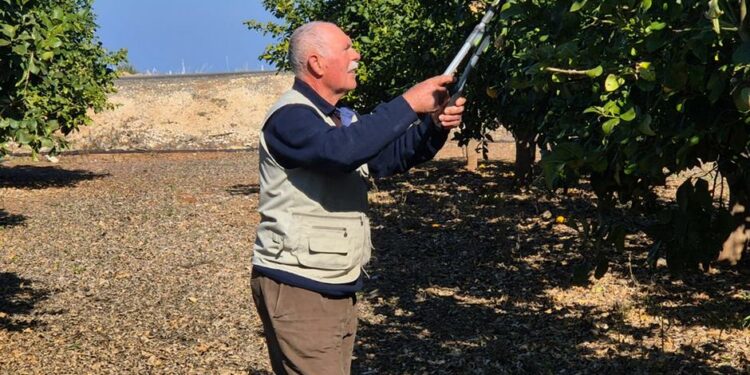Reservoirs are at their limits
The worsening drought is troubling for a country whose past water supply and irrigation policies have depended heavily on weather conditions.
Since the 1980s, Cyprus has developed a network of 108 dams and reservoirs to hold water for both drinking and irrigation. But two consecutive years of insufficient rainfall have resulted in critically reduced levels.
According to current data, they are only 26% full this year, which means they hold just 75 million cubic meters of water.
“The winter months are essential to replenish the water supplies in the reservoirs, but also the groundwater. Without enough rain in winter, there could be problems in the hot summer,” said Micha Werner, associate professor and flood and drought expert at the IHE Delft Institute in the Netherlands.
In previous years, locals, hotel and guesthouse operators, but also tourists — some six million visited the island in 2023 — have been called upon to conserve water. This is likely to be the case again this year.
Cyprus attracts millions of tourist each year, adding to the burden on its water suppliedImage: MATTHIEU CLAVEL/AFP/Getty Images
“A country like Cyprus, like a lot of the Mediterranean, is challenged not just by the variable climate, but also by the variable demand, because you of course have a tourist industry that peaks in the summer and everybody wants to shower and swim in a nice swimming pool. So this compounds the problem.”
In addition to scarce water supplies, the recent discovery of a major leak at the Mavrokolympos dam in the west of the island was widely reported to have led to further dwindling of water reserves.
Most mediterranean countries feel the impacts
Cyprus is representative of the whole Middle East Mediterranean basin, which includes other countries such as Spain, Italy, Algeria, Morrocco, Tunesia, Turkey and Israel, Werner said.
With recent drier winters elsewhere too, regions around Valencia in southern Spain, Greece, southern Italy, Morocco and Tunisia are also experiencing alarming droughts, according to data from the EU Copernicus Climate Change Service (C3S).
Mobile desalination plants to tackle crisis in cyprus
Since the early 2000s, Cyprus has been attempting to address its water shortages, at least for drinking purposes, by building five desalination plants. However, in 2023 desalinated water currently only met 60% of the country’s drinking water needs.
Expanding desalination capacity is a key priority in a 28-point action plan by the Cypriot government. Speaking to DW, Cyprus’ Minister of Agriculture Maria Panayiotou said “the government’s goal is to meet the island’s total drinking water needs through desalination so that reservoir water can be used exclusively for irrigation.”
To achieve this, the minister stated, “the government is planning to create two additional permanent desalination plants, increase the capacity of existing facilities, and introduce mobile desalination units.”
Specifically, four mobile desalination units are set to be constructed within 2025, while the two permanent plants are scheduled for completion within the next five years. Removing salt from sea water is becoming more common in many water-stressed regions of the world, but can pollute underground water, soil and marine wildlife. Experts say, however, that some brine treatment technologies are emerging that could help to tackle these issues.
Panayiotou has acknowledged that Cyprus is facing an exceptionally difficult upcoming summer, expressing the government’s readiness to provide financial support to farmers either directly or by subsidizing permanent agricultural infrastructure, such as smart irrigation systems that make better use of what water is available.
The government’s warning has led Afxentis Kalogirou and many others to refrain from purchasing seeds for crops, which are usually due to be planted in spring.
“More desalination units are the only hope for the future,” he said, adding that if something is not done aboutwater scarcityin Cyprus, agriculture will die with his generation.
Until the new desalination plants are in operation, his hopes are on rain and government support.
Edited by: Tamsin Walker
Greece’s water shortages spare tourists, leave farmers dry
To view this video please enable JavaScript, and consider upgrading to a web browser that supports HTML5 video
Source link : http://www.bing.com/news/apiclick.aspx?ref=FexRss&aid=&tid=67b865dacf1b4d05bf6a3117f3c4e3e9&url=https%3A%2F%2Fwww.dw.com%2Fen%2Fhow-can-cyprus-cope-with-winter-drought%2Fa-71685145&c=8756797192040788436&mkt=de-de
Author :
Publish date : 2025-02-21 02:57:00
Copyright for syndicated content belongs to the linked Source.



